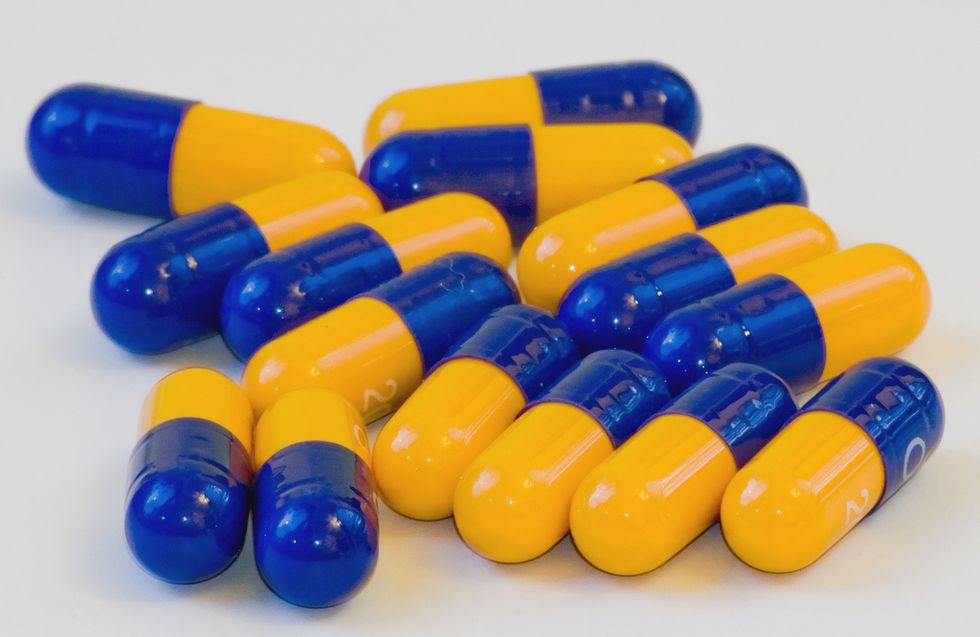For pretty much the entirety of my adolescence, depression and anxiety have been a part of my daily life. They've influenced the decisions I make, my relationships, my school work, and my self-image.
Years before I made the decision to talk to someone about it, I knew something inside wasn't right. I knew there had to be a reason for the constant stream of unwanted thoughts and endless panic. I knew that this person that was always accompanied by a dark rain cloud and was made nervous by her own shadow wasn't me.
To be honest, talking to anyone about it, much less a doctor, was terrifying. I sat there desperately trying to put into words how I felt. I'm not sure what I expected when I walked into the doctor's office, but I can tell you that I didn't expect to walk out with a prescription.
However, when I picked up that prescription and held the bottle of tiny pills in my hand, I started to cry. I know it sounds crazy and overly dramatic, and maybe it was.
But I cried because it hit me that this could mean that the seemingly endless cycle of darkness and anxiety might possible be ending.
I cried because for so long I lived without a diagnosis, without a reason, without a name for all of the terrible things happening in my head.
That prescription, to me, symbolized the validity of what I was feeling. After years of chalking it up to stress or schoolwork or simply "being a teenager", I was able to have someone look me in the eyes and tell me that I wasn't crazy.
It's been a little less than a year since then, and since then I've tried a handful of different of antidepressants and anti-anxiety medications to help get my mental health under control. Here's what I've learned since trying that very first medicine I was prescribed:
The stigma around taking medication for mental illness is almost worse than the stigma around mental illness itself.
No one wants to talk about antidepressants. No one wants to have conversations about medication prescribed for mental health disorders. You hear horror stories of people taking medication to help their mental health and turning into something resembling a zombie more than a human being. You hear terrifying tales of what happens when someone "goes off their meds". You hear medication talked about in hushed tones accompanied by glances over the shoulder to make sure no one hears.
I'm so sick of the looks I get when people find out that I take medication to manage my anxiety and depression. I'm sick of the pity, the awkwardness, the being treated like I'm made of glass. I'm sick of the stigma around medication for mental health.
People are sometimes surprised by my openness about my mental health and the ways that help me manage it. I may not walk around wearing a t-shirt that says "ask me about my depression," but I'll share if I'm asked.
The medication I take doesn't turn me into a zombie, it makes me less of one. It doesn't turn me into someone I'm not, it helps me to be more of the person I truly am. It helps make my laughter more authentic and my smiles wider. It helps gives me normal experiences when I walk outside or go to the grocery store, rather than panicked ones.
It hasn't been an easy road, and I'm still trying to find exactly the right medication that works for me. But if all of this trial and error helps me ultimately find that one medication that just clicks, then it will be worth it.
Maybe medication isn't the right helping hand for you, and that's alright. Maybe you had a bad experience with it and it did more harm than good. Maybe it didn't work for you. But don't make the people who it helps feel like outcasts or crazies. Mental illness revolves around the chemicals in our brains, so it's anything but crazy that sometimes medication can help those imbalances.
I'm not and will never be ashamed of needing the extra help of medication to manage my depression, and I'll never not be willing to talk about it. Everyone with mental illness is different, and we all deserve the time it takes to figure out what works best for us.
It's okay not be okay. It's okay to ask for help. And it's okay if that help comes in the form of medication.



















